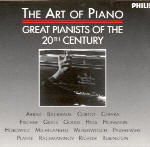The Art of Piano was designed to complement the Warner Vision video program of the same name, which surveys the 20th century’s great pianists on film. Because many of the film’s samples are sonically substandard, this set offers listeners the same artists and repertoire via superior sounding audio recordings. Whenever possible, works shown in excerpted form are presented here complete. Myra Hess’ filmed performance of the Beethoven “Appassionata” first movement (she never recorded the work) appears here for the first time on CD, although it’s pitched a half step sharp. Just about everything else in this anthology can be found on reissues devoted to the respective pianists. Some selections, though, have only been available in boxed sets and special imports, like the Beethoven Fourth Concerto with Wilhelm Backhaus and Hans Schmidt-Isserstedt conducting the Vienna Philharmonic. Similarly, Emil Gilels’ “Appassionata” has been out-of-print stateside for years, although it’s hard to see why anyone would want this stiff, square-toed performance. In the case of pianists who re-recorded certain works, their finest versions generally made the final cut. Not, however, in every case.
I prefer Backhaus’ mono Beethoven Fourth with Clemens Krauss at the helm–a more involving and warmly reproduced recording than the aforementioned 1958 stereo remake. For similar reasons, I regret Sviatoslav Richter’s wonderful Tchaikovsky First with Ancerl and the Czech Philharmonic wasn’t chosen over the exciting but raspily engineered Mravinsky/Leningrad version. All three Claudio Arrau studio versions of Beethoven’s last sonata reveal the pianist’s penchant for rhetorical inflection and spacious tempos. While Philips understandably reached into its back catalog for the great pianist’s 1966 Op. 111, his late-1950s EMI version conveys more vitality and inner propulsion.
On the plus side, Philips’ includes the first ever domestic CD transfer of Alfred Cortot’s 1953 Schumann Kinderscenen, drawing upon pristine source material. Too bad its 13 movements aren’t separately banded. Numerous short selections by Paderewski, Hofmann, Horowitz, Cziffra, Planté, Moiseiwitsch, Michelangeli, Rubinstein, and Edwin Fischer represent typical fare for these keyboard giants. By contrast, Glenn Gould pulls out all the Romantic stops in his wild, one-time-only joyride through Ravel’s La Valse. In the main, this interesting, if rather skewed cross-section of 20th century pianism holds much attraction for novice keyboard mavens.
































